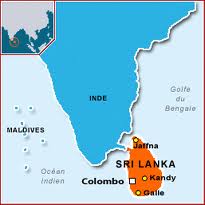Chinese influence over Sri Lanka grows

China has signed 16 agreements with Colombo on Monday. The agreements range from visa exemption and marine development to economic and technology cooperation. The agreements also promised to expand investment and increase imports from the island, reported China Daily on Tuesday. Sri Lankan President Mahinda Rajapaksa signed the agreements with China’s top legislator, Wu Bangguo, who is the highest ranking official of the Chinese legislature to visit Colombo since the end of genocidal Vanni war in May 2009.
The Sino-Sri Lankan bilateral trade volume reached $3.14 billion in 2011 – up 49.8 percent year-on-year, according to China’s Ministry of Foreign Affairs, the report by the China Daily said.
China, which is already funding $361 million into the port project and a $209 million into the airport project and several other infrastructure projects in Hambantota, has now promised a further loan of $240 million to the construction of flyovers and roads in the southern town of Hambantota.
China is also behind the $1.3 billion coal power plant in Puththa’lam, from where Tamils and Muslims are covertly encouraged to take boats towards Australia.
Sri Lanka is one of the three Dialogue Partners besides Belarus and Turkey in the SCO while India, Iran, Pakistan and Afghanistan are Observer States in the Shanghai Cooperation Organisation (SCO).
“To further secure the Indian Ocean for the Eurasians, Sri Lanka (Ceylon) has also become an associate member of the SCO through becoming a dialogue partner,” observes Mahdi Darius Nazemroaya, a geopolitical analyst and research associate at the Centre for Research on Globalization (CRG), which is based in Montreal, Canada.
“It is in this framework that Russia, China, and Iran supported the Sri Lankan government against the Liberation Tigers of Tamil Eelam (LTTE), or simply Tamil Tigers, during the Sri Lankan Civil War,” the author of ‘The Globalization of NATO’, says in his December 2010 article, titled, “The US-NATO March to War and the 21st Century “Great Game”.

